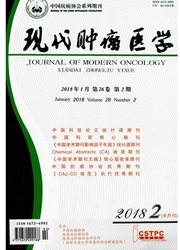

 中文摘要:
中文摘要:
脂肪酸合成酶(fatty acid synthase,FASN)是脂肪酸从头合成代谢中唯一的关键酶,在多种肿瘤中呈高水平表达。EMT(epithelial to mesenchymal transition)是指已分化的上皮细胞转化形成具有间充质细胞特点的过程,在肿瘤中,产生间充质样细胞的 EMT 进程与肿瘤转移前的多种特性相关,包括侵袭、迁移、抗凋亡等,EMT 已成为近年来肿瘤学研究的热点之一。有研究表明,FASN 在肿瘤 EMT 中起到关键作用,抑制FASN 可以逆转多种肿瘤 EMT,同时抑制肿瘤细胞的侵袭、转移、抗药性。FASN 可通过两个途径调节肿瘤EMT:第一,通过调控脂筏的组成和稳定性,进而影响定位于脂筏的蛋白,最终对 EMT 进行调控;第二,通过调节蛋白质的棕榈酰化状态,影响其功能发挥,从而调控 EMT 的发生和进展。
 英文摘要:
英文摘要:
Fatty acid synthase(FASN),the sole key enzyme of de novo fatty acid synthesis,is highly expressed in most human carcinomas. The epithelial - to - mesenchymal transition(EMT)is a process whereby epithelial cells ac-quire mesenchymal features. In tumors,acquisition of a mesenchymal - like phenotype is associated with pro - meta-static properties,including increased motility,invasion,anoikis resistance. In recent years,EMT has come to the fore-front of cancer biology. Recent surveys show that FASN inhibition could reverse EMT and block cell invasion,metasta-sis,drug - resistance as well. Regulation of FASN in EMT of cancer most focused on two aspects:FASN regulate the composition and stability of lipid rafts,and aftershock of FASN spread to protein localized in lipid raft,the final effect is the induction of EMT;another mechanism is the influence of FASN on protein palmitoylation,and so affecting their functions,and thus the occurrence of EMT. In this review,we summarize the roles of FASN and EMT in the tumor,and the relationship of FASN and EMT in tumors and its mechanism.
 同期刊论文项目
同期刊论文项目
 同项目期刊论文
同项目期刊论文
 The Expression Changes of PI-3K Family Members in Breast Invasive ductal carcinoma and the relations
The Expression Changes of PI-3K Family Members in Breast Invasive ductal carcinoma and the relations Decreased expression of repulsive guidance molecule member A by DNA methylation in colorectal cancer
Decreased expression of repulsive guidance molecule member A by DNA methylation in colorectal cancer Developed and evaluated a multiplex mRNA profiling system for body fluid identification in Chinese H
Developed and evaluated a multiplex mRNA profiling system for body fluid identification in Chinese H Development of a candidate method for forensic microbial genotyping using multiplex pyrosequencing c
Development of a candidate method for forensic microbial genotyping using multiplex pyrosequencing c Compounddanshen tablet amelioratedaβ25-35-induced spatial memory impairment inmice viarescuing imbal
Compounddanshen tablet amelioratedaβ25-35-induced spatial memory impairment inmice viarescuing imbal Chronicintermittent hypoxia promotes expression of 3-mercaptopyruvatesulfurtransferasein adult rat m
Chronicintermittent hypoxia promotes expression of 3-mercaptopyruvatesulfurtransferasein adult rat m Interleukin-8Regulates Endothelial Permeability byDown-regulation of Tight Junction but notDependent
Interleukin-8Regulates Endothelial Permeability byDown-regulation of Tight Junction but notDependent 期刊信息
期刊信息
